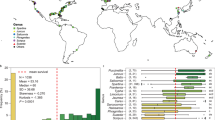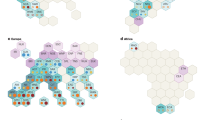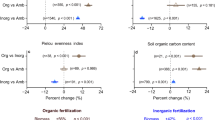Abstract
IN obtaining data for the two species of watercress for “Biological Flora” accounts, it was found that, whereas the seeds of Nasturtium officinale R.Br. would germinate both in the light and in the dark, those of N. microphyllum Boenningh. ex Rchb.1 would only germinate in the light. This has been checked, as is shown below—there were fifty seeds in each Petri dish and they were kept on moist filter paper at laboratory temperature (about 65° F.).
This is a preview of subscription content, access via your institution
Access options
Subscribe to this journal
Receive 51 print issues and online access
$199.00 per year
only $3.90 per issue
Buy this article
- Purchase on Springer Link
- Instant access to full article PDF
Prices may be subject to local taxes which are calculated during checkout
Similar content being viewed by others
References
Airy Shaw, H. K., Kew Bull., No. 1, 39 (1947).
Howard, H. W., and Manton, I., Ann. Bot., N.S., 10, 1 (1946).
Honing, J. A. Genetica, 12, 441 (1930).
Author information
Authors and Affiliations
Rights and permissions
About this article
Cite this article
HOWARD, H., LYON, A. Effect of Light on the Germination of Watercress Seeds. Nature 168, 253–254 (1951). https://doi.org/10.1038/168253a0
Issue Date:
DOI: https://doi.org/10.1038/168253a0
This article is cited by
-
Über die Lichtkeimung vonLythrum salicaria
Planta (1953)
Comments
By submitting a comment you agree to abide by our Terms and Community Guidelines. If you find something abusive or that does not comply with our terms or guidelines please flag it as inappropriate.



